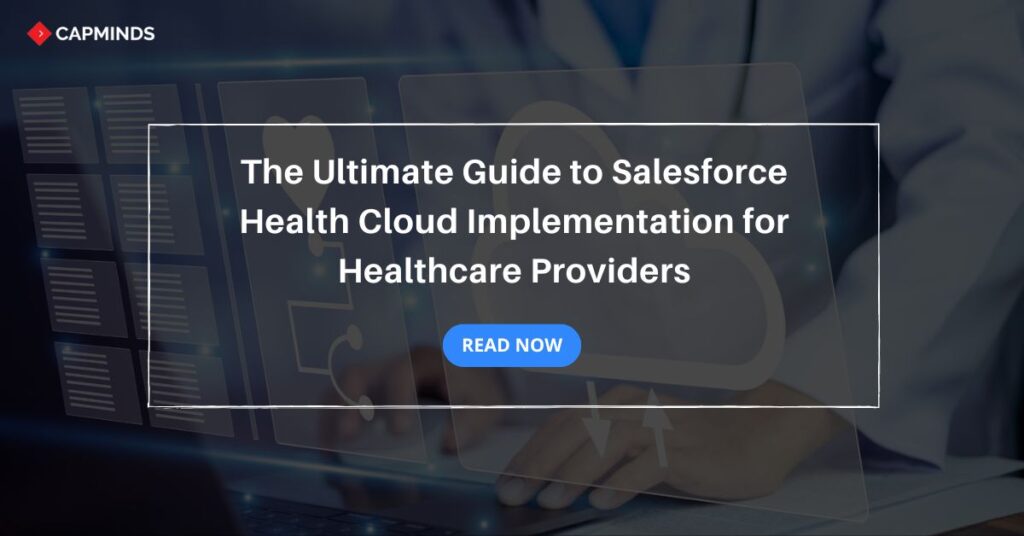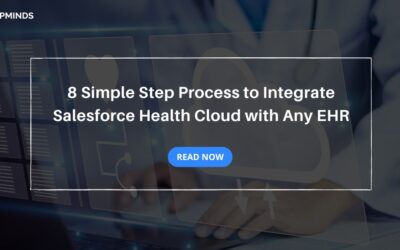The Ultimate Guide to Salesforce Health Cloud Implementation for Healthcare Providers
Salesforce Health Cloud has emerged as a leading healthcare CRM platform that not only unifies patient data but also revolutionizes care team collaboration, population health management, and patient engagement strategies.
According to a 2023 Gartner report on healthcare CRM solutions, platforms like Salesforce Health Cloud are experiencing an annual growth rate of nearly 20% as providers and payers alike invest heavily in scalable, data-driven solutions.
If you’re looking to leverage this cutting-edge platform, this comprehensive guide covers essential features, benefits, key implementation steps, and insights into maximizing your Health Cloud ROI.
What Is Salesforce Health Cloud?
Salesforce Health Cloud is a HIPAA-compliant healthcare CRM designed to integrate seamlessly with existing EHR systems, unify disparate patient data sources, and empower providers to deliver more personalized, proactive, and value-based care.
Built on the robust Salesforce platform, Health Cloud consolidates patient medical histories, social determinants of health, insurance details, and treatment plans into a single, unified profile. This holistic approach enhances care coordination, improves patient satisfaction, and fosters more informed clinical decision-making.
Related: Salesforce Health Cloud: Breaking New Boundaries with Commerce Cloud
Key Salesforce Health Cloud Features to Accelerate Patient-Centric Care
1. Unified Patient Profiles
- Health Cloud aggregates clinical and non-clinical data—including claims, prescriptions, lab results, and social factors—into an easily accessible 360-degree patient view.
- This data-rich perspective helps providers identify care gaps, tailor treatment plans, and improve outcomes.
2. Seamless Care Team Collaboration
- By providing secure messaging, shared care plans, and task assignments, Health Cloud streamlines multidisciplinary teamwork.
- Recent studies show that improved collaboration can reduce hospital readmission rates by up to 15%, according to a 2022 study published in the Journal of Interprofessional Care.
3. Patient Engagement Tools
- Health Cloud’s patient engagement capabilities ranging from automated appointment reminders and secure patient portals to educational outreach.
- These features address healthcare’s biggest challenges such as keeping patients informed, adherent, and satisfied.
- With patient engagement technology, some organizations have seen a 30% boost in patient satisfaction metrics.
4. Advanced Analytics and Reporting
- Leverage Salesforce Einstein Analytics and other AI-driven tools to extract actionable insights, predict patient risks, and track population health outcomes.
- These real-time dashboards help identify patterns, guide resource allocation, and fuel continuous improvement efforts.
5. EHR Integration and Interoperability
- Health Cloud integrates seamlessly with major EHR systems (like Epic, Cerner, and Allscripts), ensuring bidirectional data flow.
- This level of interoperability supports compliance with CMS interoperability rules and helps reduce administrative burden, allowing clinicians to focus on delivering high-quality care.
6. Scalability Across Healthcare Sectors
- From single-specialty clinics to multi-hospital networks and payers, Salesforce Health Cloud adapts to your organizational scale.
- As value-based care models expand, Health Cloud can evolve with you, enabling clinical and administrative agility.
Related: Top 5 Simple Known and Unknown Technical Barriers of the Salesforce Health Cloud
Benefits of Implementing Salesforce Health Cloud
1. Improved Patient Outcomes with Centralized Data
Research indicates that organizations leveraging a unified patient view can improve adherence to care plans and reduce preventable hospitalizations by 10% or more.
2. Streamlined Workflows and Reduced Burnout
Automated workflows and simplified collaboration can cut administrative tasks for providers by up to 40%, alleviating clinician burnout and improving overall staff satisfaction.
3. Enhanced Patient Communication and Engagement
Proactive patient communication—through email, text reminders, and patient portals—has been linked to a 20% decrease in no-show rates, improving operational efficiency and revenue stability.
4. Data-Driven Insights for Continuous Improvement
Integrating analytics enables data-driven decision-making, fostering evidence-based improvements and bolstering population health management strategies.
5. Regulatory Compliance and Security
Salesforce Health Cloud adheres to HIPAA and HITRUST standards, ensuring robust data security. With ongoing cybersecurity threats, having a secure platform is non-negotiable.
6. Scalable Solutions for Evolving Healthcare Needs
As healthcare organizations grow, Health Cloud’s modular architecture and expanding app ecosystem make scaling services, integrating new care models, and entering new markets seamless.
Related: From Vision to Reality: How Salesforce Health Cloud Delivers Superior Care for Life Science
Salesforce Health Cloud Implementation Process: A Step-by-Step Guide
1. Define Clear, Measurable Objectives
Start by identifying KPI-driven goals—such as improving HEDIS scores, reducing readmissions by 5%, or boosting patient satisfaction ratings—ensuring that every decision aligns with tangible metrics.
2. Engage Stakeholders Early
Involve C-suite leaders, IT teams, clinicians, and patient representatives from the outset. Early buy-in ensures smooth adoption and helps your teams anticipate and mitigate resistance to change.
3. Conduct a Comprehensive Needs Assessment
Map out current workflows, data sources, clinical processes, and patient touchpoints. Understand existing gaps, inefficiencies, and patient pain points to shape your customization and configuration priorities.
4. Plan and Execute Data Migration
Work with certified Salesforce consultants to ensure accurate data migration. Properly cleaning and normalizing patient records will minimize workflow disruptions and maintain data integrity.
5. Provide Targeted User Training
Comprehensive training sessions and ongoing support can boost user adoption rates by up to 30%. Tailor training programs for different roles—administrators, clinicians, billing staff—to maximize platform use.
6. Leverage Core Health Cloud Features
Make full use of care plan templates, pre-built dashboards, secure messaging tools, and other native features to accelerate time-to-value.
7. Integrate With EHR and Other Systems
Prioritize seamless EHR integration to unify data streams and ensure a single source of truth. This approach reduces duplicate charting, improves coding accuracy, and enhances care transitions.
8. Monitor, Measure, and Optimize
Regularly track performance against defined KPIs. Use analytics to identify areas for improvement, such as care gaps, patient engagement shortfalls, or inefficiencies in scheduling workflows.
9. Partner With Health Cloud Experts
Consider working with Salesforce-certified Health Cloud implementation partners. Their domain expertise, technical know-how, and best practice frameworks can cut deployment time and cost significantly.
Recent Industry Trends and Forward-Looking Insights
- AI-Driven Healthcare CRM: Advances in AI and machine learning continue to shape healthcare analytics. Expect predictive modeling and patient risk stratification tools to become increasingly sophisticated within the Health Cloud.
- Telehealth Integration: As telemedicine gains traction, integrating telehealth solutions with Health Cloud will help providers keep patients engaged from anywhere, aligning with recent CMS policies and patient convenience demands.
- Value-Based Care Alignment: With CMS pushing for value-based care models, using Health Cloud to track outcomes, manage cohorts, and ensure quality benchmarks will be critical.
Salesforce Health Cloud stands at the nexus of patient engagement, care coordination, regulatory compliance, and scalable healthcare solutions. Health Cloud enables providers to enhance patient outcomes, reduce costs, and embrace the industry’s shift toward value-based care by unifying data, streamlining workflows, and delivering actionable insights.
As you plan your Health Cloud implementation, keep your objectives clear, involve stakeholders early, and consider expert guidance to navigate complexities.
By following these best practices and capitalizing on cutting-edge Health Cloud features, your organization will thrive in today’s dynamic healthcare ecosystem.
Salesforce Health Cloud Solution from CapMinds
CapMinds offers you the smartest and safest Health Cloud Security and Interoperability services across healthcare platforms. Our advanced scalable features, secure cloud, system patching, and version upgrades will transform your organization into a future tech-friendly one. We offer all kinds of integrated services across various health systems and platforms along with unique customization and 24/7 support.
Our medical device integration, connected health, healthcare cloud, and cybersecurity solutions like Salesforce Health Cloud cover health tech startups, the federal government, multi-specialty practices, large healthcare practices, and small clinics.
Our most popular features:
- HL7 FHIR
- HIPAA compliance
- MACRA, MIPS
- Meaningful Use
- Cloud Security
- AI solutions
- Cloud-based EHR solution with advanced techs guaranteeing your medical facility 100% cybersecurity
CapMinds’ Interoperability and compliance services cover your patients’ health data with maximum security, privacy, and confidentiality. We update ourselves with the latest versions like HL7 Version 2, Version 3, FHIR, SMART on FHIR, CDA, X12, Mirthconnect, and security standards.
CapMinds offers the best HL7 integration and HL7/FHIR interface development services for the federal government, health tech startups, laboratories, clinics, and practices.
“Partner with us to get the best out of future-proof health cloud security services”




